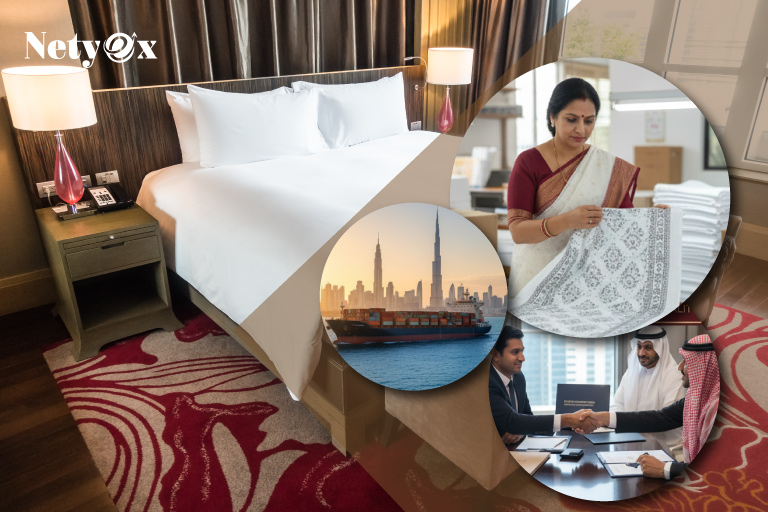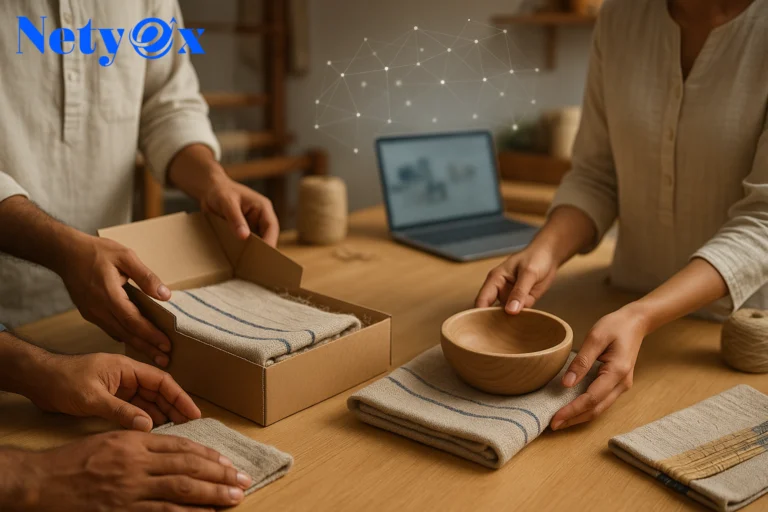Introduction to the Global Cotton Bedsheet Trade
Why Cotton Bedsheets Are in High Demand Globally
Cotton bedsheets are synonymous with comfort, luxury, and durability—three qualities that define the global hospitality industry. From budget lodges to five-star resorts, hotels worldwide prefer cotton fabric for its breathability and softness. As international tourism rebounds post-pandemic, the demand for high-quality cotton bedding has surged across the Middle East, especially in the UAE.
The Role of India in the International Textile Market
India is the second-largest exporter of cotton textiles globally. The country’s textile hubs in Gujarat, Tamil Nadu, and Maharashtra produce premium cotton varieties, such as long-staple Shankar-6, ideal for hotel-grade linens. With cost-effective manufacturing and skilled craftsmanship, Indian suppliers hold a strong edge in supplying luxury bedding products to the Middle East.
Why Dubai Hotels Prefer Indian Cotton Bedsheets
Dubai’s hospitality industry thrives on excellence. Hotels in the UAE value Indian bedsheets for their high thread counts, vibrant designs, and easy maintenance. Moreover, Indian exporters offer flexible customization, quick shipping, and competitive pricing—making them the preferred partners for Dubai’s booming hotel sector.
Understanding the Export Market for Cotton Bedsheets
Key Export Statistics and Market Trends
According to the Ministry of Commerce, India exported over $2.5 billion worth of cotton made-ups (including bedsheets and linens) in 2024, with the UAE being among the top destinations. Demand from Dubai hotels is expected to grow further with the opening of new resorts ahead of Expo 2030.
Dubai’s Hospitality Industry Demand for Indian Textiles
Dubai’s hotel sector continues to expand rapidly. From luxury resorts on Palm Jumeirah to business hotels near Downtown Dubai, each property requires thousands of bedsheets annually. This creates consistent bulk demand—ideal for exporters seeking long-term contracts.
Major Competitors and Opportunities
While Pakistan, China, and Turkey are strong players in the textile export space, India holds a unique advantage in cotton quality, eco-friendly production, and custom design flexibility. The key is maintaining consistent supply and building trust with hotel procurement teams.
Preparing for Export from India
Choosing the Right Type of Cotton Fabric
Exporters should focus on hotel-grade cotton—preferably 100% combed, mercerized, or Egyptian cotton. Percale and sateen weaves are the most popular among hotels for their smooth finish and durability.
Meeting Quality Standards
Dubai hotels adhere to strict standards. Exporters must ensure:
- Minimum 300–600 thread count
- Colorfastness and shrink-resistance
- Hypoallergenic and anti-pilling finish
Branding, Labeling, and Packaging Guidelines
High-quality, eco-friendly packaging enhances appeal. Include details such as:
- Composition (100% cotton)
- Size and GSM
- Washing instructions
- Country of origin label (“Made in India”)
Obtaining Export Licenses and Certifications
Import Export Code (IEC) Registration
To begin exporting, register with the Directorate General of Foreign Trade (DGFT) to obtain an IEC—mandatory for all international shipments.
GST and Business Setup
Set up your business as an exporter under India’s GST system and register with TEXPROCIL for benefits under export promotion schemes.
Certifications Required for Textile Export
- Oeko-Tex Certification – Ensures textiles are free from harmful substances.
- ISO 9001 – Quality management certification.
- SA 8000 – For social accountability and ethical manufacturing.
Finding Buyers in Dubai’s Hospitality Sector
Targeting Hotel Chains, Resorts, and Distributors
Reach out directly to procurement departments of hotel groups like Jumeirah, Hilton, Marriott, and Accor. Dubai-based linen distributors also act as intermediaries.
Using B2B Marketplaces
List your products on:
- Alibaba
- TradeIndia
- ExportersIndia
- IndiaMART International
Networking at Trade Fairs
Attend exhibitions like Heimtextil Dubai and The Hotel Show Dubai to build valuable industry connections.
Legal and Customs Requirements for Exporting to Dubai
Understanding UAE Import Regulations
Before shipping cotton bedsheets from India to Dubai, exporters must comply with UAE customs and import laws. The UAE has a liberal import policy, but textiles fall under regulated commodities due to quality and labeling standards.
To clear customs, your products must:
- Clearly state fiber composition and country of origin
- Include Arabic and English labels
- Meet UAE’s hygiene and safety standards
Ensure that your buyer in Dubai is registered with the Dubai Chamber of Commerce or Dubai Customs Authority, which expedites the clearance process.
Customs Documentation and HS Codes for Bedsheets
The Harmonized System (HS) Code for cotton bedsheets is 6302.21 (for printed) and 6302.31 (for plain). Essential documents include:
- Commercial Invoice
- Packing List
- Bill of Lading or Airway Bill
- Certificate of Origin (from FIEO or Chamber of Commerce)
- Inspection Certificate (if required by buyer)
These documents must match your invoice details exactly to avoid clearance delays.
Avoiding Common Export Compliance Mistakes
Common mistakes to avoid:
- Incorrect HS code classification
- Missing product labeling in Arabic
- Incomplete certificate of origin
- Failing to declare textile composition accurately
Hiring a customs broker or freight forwarder simplifies this process and ensures full compliance.
Shipping and Logistics Management
Choosing the Best Mode of Transport
For cotton bedsheets, sea freight is the most economical choice, especially for bulk orders. However, air freight may be used for urgent or sample shipments.
Popular shipping ports:
- From India: Nhava Sheva (Mumbai), Mundra, Chennai
- To UAE: Jebel Ali Port (Dubai)
Transit time for sea freight is usually 4–6 days, making it one of the fastest routes in the textile trade.
Partnering with Freight Forwarders and Clearing Agents
Collaborate with experienced forwarders like Maersk, DHL Global Forwarding, or FedEx Trade Networks. They handle paperwork, insurance, and customs clearance efficiently. Always obtain freight insurance to cover damage or loss during transit.
Packaging Standards for Textile Shipments
Follow export packaging standards:
- Use poly-wrapped inner packaging to prevent moisture damage.
- Reinforce outer cartons with waterproof coating.
- Label packages with exporter/importer details and HS codes.
Sustainable packaging—like biodegradable polybags or recycled cartons—is becoming a preferred choice among eco-conscious hotel buyers.
Pricing and Payment Terms
Costing Methods for Export Pricing
To determine your selling price, include:
- Cost of production (fabric, stitching, finishing)
- Packaging & labeling
- Freight & insurance
- Customs clearance charges
- Export incentives and profit margin
Use FOB (Free on Board) or CIF (Cost, Insurance, Freight) pricing depending on your buyer’s preference.
Setting Minimum Order Quantities (MOQs)
For hotel buyers, an MOQ of 500–1,000 bedsheet sets is typical. Smaller quantities can be offered for sample evaluation before long-term contracts.
Payment Methods (LCs, TT, and Escrow)
To secure transactions:
- Use Letter of Credit (LC) for large orders.
- Accept Telegraphic Transfers (TT) for repeat clients.
- Consider Escrow services for first-time buyers to ensure mutual trust.
Always verify the buyer’s credibility through platforms like TEXPROCIL’s verified exporter list or the Dubai Chamber database.
Marketing and Branding for International Buyers
Building a Strong Export Brand Identity
Your brand should communicate reliability, quality, and sustainability. Use professional product catalogs with clear photos and specifications. Offer custom embroidery options for hotels to personalize their linens.
Creating a B2B Export Website with SEO
Your export website is your digital storefront. Ensure it includes:
- Product pages with specifications (GSM, thread count, dimensions)
- Certificates and factory photos
- Contact forms for inquiries
Use keywords like “cotton bedsheet exporters to Dubai” or “hotel linen manufacturers in India” to rank on Google.
Social Media Marketing and LinkedIn Outreach
Engage buyers through:
- LinkedIn outreach to procurement managers
- Instagram posts showcasing fabric textures and production quality
- B2B groups on Facebook focusing on hospitality supplies
Regularly share customer testimonials and shipment updates to build credibility.
Export Promotion Councils and Support Organizations
Role of TEXPROCIL
The Cotton Textiles Export Promotion Council (TEXPROCIL) helps exporters access international buyers and offers trade fair participation support. Members also get market insights and export incentives.
Leveraging Government Schemes
Key benefits include:
- RoDTEP (Remission of Duties and Taxes on Exported Products)
- Interest Equalization Scheme for lower export financing costs
- Market Access Initiative (MAI) for international trade fair participation
Export Finance and Insurance Support
The Export Credit Guarantee Corporation (ECGC) safeguards exporters from payment defaults, while EXIM Bank of India offers competitive financing for export orders.
Case Study: Successful Indian Exporters Supplying Dubai Hotels
Example of an SME Exporter Scaling through B2B Platforms
A Surat-based textile SME, CotFab Linens Pvt. Ltd., started by listing products on Alibaba and TradeIndia. Within six months, they secured a deal with a Dubai-based distributor supplying boutique hotels. Their success came from providing consistent quality and fast shipping.
Key Lessons Learned
- Always start with samples and small orders.
- Invest in strong communication and follow-ups.
- Offer customized packaging with hotel logos.
Consistency and reliability can turn one-time buyers into long-term partners.
Common Challenges and How to Overcome Them
| Challenge | Solution |
| Quality inconsistency | Conduct third-party inspections before shipping |
| Delayed payments | Use LC or ECGC insurance |
| High logistics cost | Consolidate shipments or negotiate with freight agents |
| Regulatory updates | Subscribe to TEXPROCIL and DGFT newsletters |
| Market competition | Focus on sustainability and organic fabric offerings |
Future Opportunities in the Cotton Textile Export Industry
Sustainable and Organic Cotton Trends
Hotels are moving toward eco-friendly and GOTS-certified organic cotton. Exporters offering sustainable production processes can command premium pricing.
Expansion to Other GCC Countries
After establishing a presence in Dubai, Indian exporters can expand to Qatar, Oman, Bahrain, and Saudi Arabia, which share similar demand patterns.
Integrating Technology in Supply Chain Management
Use ERP and blockchain solutions to enhance traceability, manage inventory, and ensure transparency across the supply chain.
Frequently Asked Questions (FAQs)
1. What is the minimum export quantity for cotton bedsheets to Dubai hotels?
Typically, a minimum of 500–1,000 sets is required for hotel contracts, though sample shipments can be smaller.
2. How long does it take to ship from India to Dubai?
Sea freight usually takes 4–6 days, while air freight can deliver within 1–2 days.
3. Do I need a specific license to export to Dubai?
Yes, you need an Import Export Code (IEC) from DGFT and relevant certifications such as Oeko-Tex or ISO.
4. Which Indian ports are best for shipping to Dubai?
The top ports are Nhava Sheva (Mumbai), Mundra (Gujarat), and Chennai (Tamil Nadu).
5. What are the top trade shows for textile exporters?
Participate in Heimtextil Dubai and The Hotel Show Dubai for maximum exposure.
6. How can I find hotel buyers in Dubai?
You can reach hotel procurement managers via LinkedIn, B2B platforms, or through Dubai-based import agents specializing in hospitality linens.
Conclusion
Exporting cotton bedsheets from India to Dubai hotels is a lucrative business opportunity that blends India’s textile excellence with Dubai’s luxury hospitality demand. With proper licensing, consistent quality, and strong branding, Indian exporters can establish lasting partnerships across the UAE.
Start small, stay compliant, and focus on reliability — and soon, your brand could be gracing hotel rooms across Dubai’s skyline.













